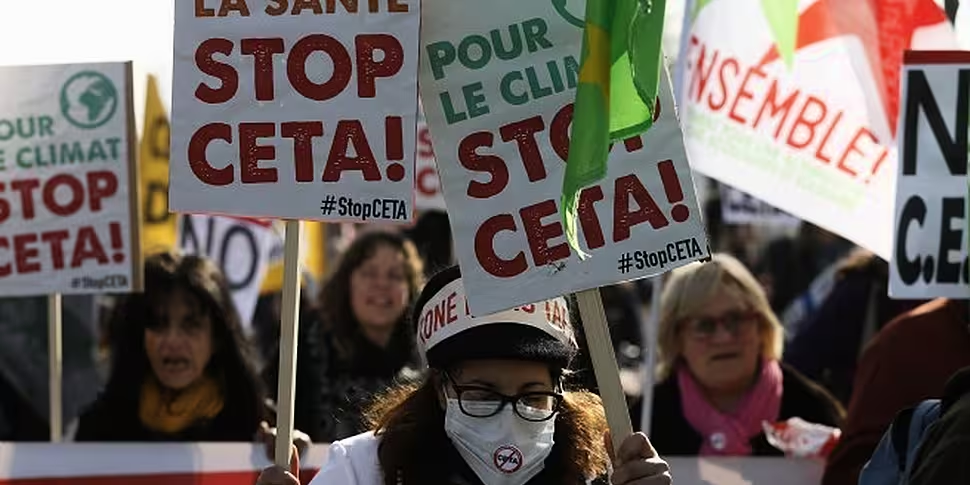The European Parliament has voted in favour of a controversial trade deal between the EU and Canada.
The Comprehensive Economic and Trade Agreement (CETA) between the two markets has provoked widespread protests in many EU countries.
The vote was passed by 408-254 while crowds of demonstrators protested the deal outside the Strasbourg Parliament building.
The European Parliament backing comes after CETA's future was put in temporary doubt last October, when the small Belgian region of Wallonia vetoed the deal.
The Wallonia veto was overcome when an addendum to the deal addressing regional concerns over the rights of farmers and governments was introduced.
The Minister for Jobs, Enterprise and Innovation, Mary Mitchell O’Connor welcomed the vote which will remove trade tariffs on most goods and services between the EU and Canada and open up Canada's public procurement market to EU countries.
However, many campaigners have highlighted fears the deal will allow multi-national companies to challenge Irish laws and regulations in court.
They are also concerned about the impact it will have on food standards, public services and financial regulation.
Investment Court System
The main concern among campaigners centres on the proposed investor court which would allow multi-nationals to challenge a host of EU reforms - including environmental regulation, public service nationalisation and financial regulation.
Originally entitled the Investor-State Dispute Settlement (ISDS), the controversial court has now been rebranded as an “Investment Court System” (ICS).
While today’s vote will see parts of the deal implemented within the coming months, the ICS will still require ratification from individual EU nations - a process that could take years.
Ireland has already provisionally signed the deal with no significant debate or vote in the Dáil.

Activists stage a demonstration against the so-called CETA trade deal outside the European Parliament in Strasbourg, eastern France, 15-Feb-2017. Image: AP Photo/Jean-Francois Badias
Minister Mitchell O’Connor said the new deal will “boost goods and services trade and investment flows” between the EU and Canada while delivering jobs and growth on both sides of the Atlantic.
She said the deal will create sizeable new market access opportunities in services and investment for Irish firms while also providing access to Canadian public contracts.
“Amid rising sentiment towards closing down trade opportunities, it is important that trading blocs such as the EU and Canada can show the way forward lies in partnership and not protectionism,” she said.
“I will be leading a trade mission to Canada in late May to promote the advantages of the agreement and to assist Irish firms in building and expanding their footprint in the Canadian market.”
Ireland’s four Fine Gael MEP’s - Seán Kelly, Mairead McGuinness, Brian Hayes and Deirdre Clune - voted in favour of the deal.
Multi-national corporations
Sinn Féin MEP Matt Carthy said he was very disappointed the “flawed deal that will negatively impact on Irish farmers, the Irish economy and the democratic system” was passed.
“The people who have been pressing this the hardest have been the large multi-national corporations and their lobbyists,” he told EuroParlRadio.
“The reason why, is because they see CETA as an opportunity to reduce the regulation and the red tape and bureaucracy as they see it.
“But that means that they are also reducing the standards as we know it in relation to food, in relation to workers rights and in relation to other democratic and judicial systems.”
Mr Carthy’s Sinn Féin colleagues in Europe, Lynn Boylan and Liadh Ní Riada also voted against the deal along with independents Luke ‘Ming’ Flanagan, Nessa Childers and Marian Harkin.
SF reps proud to be among 254 MEPs who supported Irish farmers, workers, courts & rights by rejecting #CETA We lost battle but fight goes on pic.twitter.com/CDvnCC6WTY
— Matt Carthy MEP (@mattcarthy) February 15, 2017
Deirdre Clune - also a Fine Gael MEP - said the deal has “enormous potential for a range of Irish businesses.
“If you are in the export orientated business - which I think up to 80% of our small businesses are - well then there is a new market provided.
“If you are in Canada - 35 million plus citizens and consumers who are like-minded European consumers - it mean your products if you are exporting them will not now have tariffs or duties on them.”
“[You will have] free access to markets in Canada and if you are in professional services then you can pitch tender for jobs and for contracts in Canada.”
Great to see the #StopCETA protesters outside the EU Parliament today. Fair play lads! pic.twitter.com/2kFuWdFenP
— Lynn Boylan MEP (@LNBDublin) February 15, 2017
The President of the European Parliament, Jean Claude Juncker welcomed the vote which concludes the ratification of the deal at EU level.
EU companies and citizens will start to reap the benefits that the agreement offers as soon as possible,” he said. “This trade deal has been subject to an in-depth parliamentary scrutiny which reflects the increased interest of citizens in trade policy.”
“I now call on all Member States to conduct an inclusive and thorough discussion at national level with the relevant stakeholders in the context of the national ratification process of the agreement."
TTIP
A similar trade deal between the EU and the US was also the subject of large-scale protests and is currently on hold - with the election of US President Donald Trump throwing the future of the global trade system into doubt.
There are deep concerns among many anti-CETA campaigners that the approximately 40,000 US corporations with subsidiaries in Canada could now use the Canadian deal to challenge European laws and regulations.









